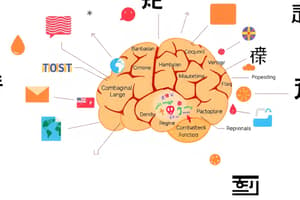Podcast
Questions and Answers
Your brain only weighs two pounds.
Your brain only weighs two pounds.
False (B)
Being multilingual can change how your brain functions.
Being multilingual can change how your brain functions.
True (A)
Scientists believe there is a limit to how many languages individuals can learn.
Scientists believe there is a limit to how many languages individuals can learn.
False (B)
Languages in the brain compete with each other.
Languages in the brain compete with each other.
The brain becomes inflexible when managing multiple languages.
The brain becomes inflexible when managing multiple languages.
Cognates are words that sound similar in multiple languages.
Cognates are words that sound similar in multiple languages.
Switching frequently between languages has no impact on communication.
Switching frequently between languages has no impact on communication.
Your native language is always the most dominant when learning a new language.
Your native language is always the most dominant when learning a new language.
Speaking multiple languages connects you only to your native community.
Speaking multiple languages connects you only to your native community.
Andres Ortega Cruz moved from Honduras to Miami.
Andres Ortega Cruz moved from Honduras to Miami.
Flashcards are hidden until you start studying
Study Notes
Connection Between Brain and Language
- The human brain weighs approximately three pounds, only slightly heavier than a pineapple.
- Responsible for processing, speaking, hearing, and understanding language.
- Being multilingual leads to notable changes in brain structure and function.
Language Processing in the Brain
- Initially believed that separate brain areas were responsible for each language; this has been disproven.
- There is no limit to the number of languages a person can learn; all languages share the same brain regions.
- The brain adapts by expanding language-related areas to accommodate new languages.
- Multilingual individuals may experience competition between languages, with the native language often being more dominant initially.
Language Switching: Benefits and Challenges
- Speaking multiple languages connects individuals to diverse communities and cultures.
- Native language fosters familial and cultural ties, while the community's language enhances social connections.
- Multilingualism can aid English learners by allowing them to leverage their native language for understanding new concepts (e.g., cognates).
- Example of cognates: "bicycle" in English corresponds to "bicileta" in Spanish and Portuguese, "bisikleta" in Tagalog, and "bisiklet" in Haitian Creole.
- Frequent language switching can lead to difficulties in using one language exclusively, causing frustration for some individuals.
- Personal anecdote: Andres Ortega Cruz experiences challenges in using only one language due to habitual switching between Spanish and English.
- The multilingual brain is characterized by greater flexibility and the ability to manage multiple languages seamlessly.
Studying That Suits You
Use AI to generate personalized quizzes and flashcards to suit your learning preferences.




